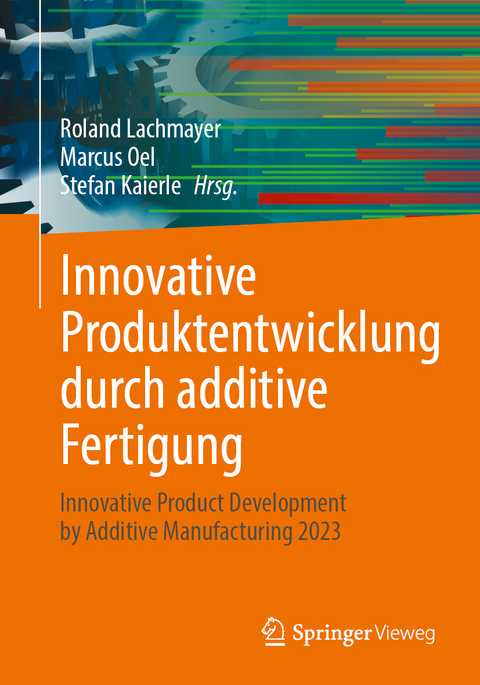
Innovative Produktentwicklung durch additive Fertigung
Springer Berlin (Verlag)
978-3-662-69326-1 (ISBN)
- Noch nicht erschienen - erscheint am 04.03.2025
- Versandkostenfrei innerhalb Deutschlands
- Auch auf Rechnung
- Verfügbarkeit in der Filiale vor Ort prüfen
- Artikel merken
Additive Manufacturing processes are already being used successfully in wide-ranging areas such as the automotive industry, mechanical and plant engineering and medical technology. Due to high flexibility, targeted variation of the machine parameters and the often contactless production, there is a considerable added value compared to conventional processes. A decisive factor in the process chain of additive manufacturing is the design. Components can be newly or differently designed and optimized, for example, with regard to their topology or the integration of functions and effects. For an evaluation of suitability, potentials and requirements must be specified, geometries must be designed and components must be simulated and validated. In addition, a close link between internal company processes, business models and the design are necessary.
Prof. Dr.-Ing. Roland Lachmayer ist der Gründungsdirektor und Leiter des Instituts für Produktentwicklung und Gerätebau (IPeG) an der Leibniz Universität Hannover.
Marcus Oel M.Sc. ist seit 2021 wissenschaftlicher Mitarbeiter in der Arbeitsgruppe "Printed Effects" am Institut für Produktentwicklung und Gerätebau (IPeG) der Leibniz Universität Hannover.
Prof. Dr.-Ing. Stefan Kaierle ist Geschäftsführender Vorstand am Laser Zentrum Hannover e.V. (LZH) und Professor an der Leibniz Universität Hannover.
Einleitung.- Konzept einer additiven Großfertigungsanlage zur skalenunabhängigen additiven Fertigung und Reparatur.- Optimising fatigue quality assurance in Additive Manufacturing: A review on internal defects and surface roughness.- An integrated design process for lightweight AM products using the DED process.- Knowledge-Based Postprocessing of Topology Optimized Components using Additive Manufacturing
as an Example.- Mikrostruktursimulation für die Additive Fertigung von Metallen - eine Übersicht.- The Role or Rule of the Development Methodology for Additive Manufacturing.- Progress in Additive Manufacturing of Optical Elements.- Fused deposition modeling and its extension through metal-filled filaments as a means of self-help for individuals with physical disabilities.- Development and Evaluation of a Compact Processing Head for Additive Manufacturing with Laser-Assisted Double-Wire Welding with Nontransferred Arc.- Reduction of sintering distortion in metal binder jetting -A tribological approach.- 3D-Solder-Printing for electrical powerlines.- Designing a methodological framework for the individualization of prosthetic implants: a literature-based approach.- Highlighting new Possibilities: A Comparison of SLOT and µCT in the Analysis of 3D Printed Optical Elements.- Surface Modification of Giant Shell Quantum Dots for Enhanced Stability in Additive Manufactured Silicone Waveguides.- Additive Manufacturing of Metallic Multi-Material Parts: Local Conductivity Adjustment through Functionally Graded Material Transitions of 316L and CuCrZr.- Corrosion Behavior of an Additively Manufactured Functionally Graded Material.- Development of a laser double-wire Directed Energy Deposition process for Functionally Graded Materials and in-situ alloying.
| Erscheint lt. Verlag | 4.3.2025 |
|---|---|
| Zusatzinfo | XX, 339 S. 120 Abb., 114 Abb. in Farbe. Textbook for German language market. |
| Verlagsort | Berlin |
| Sprache | deutsch |
| Maße | 168 x 240 mm |
| Themenwelt | Technik ► Elektrotechnik / Energietechnik |
| Technik ► Maschinenbau | |
| Schlagworte | additive manufacturing process • Automotive Industry • Design and Optimization • IPDAM • Mechanical and plant engineering • Process Control • Product Development |
| ISBN-10 | 3-662-69326-7 / 3662693267 |
| ISBN-13 | 978-3-662-69326-1 / 9783662693261 |
| Zustand | Neuware |
| Informationen gemäß Produktsicherheitsverordnung (GPSR) | |
| Haben Sie eine Frage zum Produkt? |
aus dem Bereich


